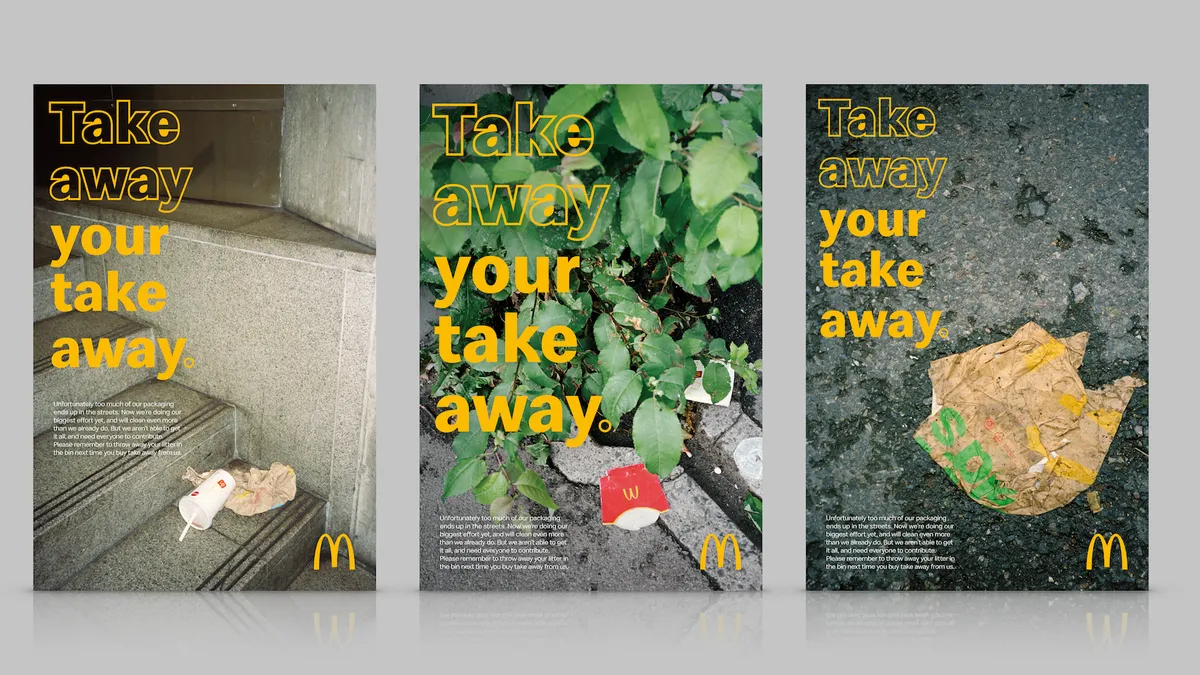Dive Brief:
- McDonald's Norway is running an advertising campaign that tackles its role in littering as the largest takeout restaurant in the country, per news shared in an email with Marketing Dive.
- Print, social media and out-of-home (OOH) ads photographed by Jói Kjartans capture what the brand is calling "iconic trash," where packaging like burger wrappers and soda cups have been left out as unsightly street refuse. Copy reads "take away your take away," reminding consumers to throw out their trash after they've finished their meals.
- Developed with agencies NORD DDB, WergelandApenes and OMD, the effort also places waste bins near the OOH placements so that the chain's Golden Arches double as beacons for places to toss trash. TV and online ads amplify the message, while McDonald's has partnered on a pilot project with Keep Norway Clean for further cleanup initiatives.
Dive Insight:
McDonald’s is demonstrating a willingness to show its iconography in a less flattering light to spur customers to cut out littering. The warts-and-all concept recognizes the outsized role takeout plays in pollution. Products like single-use bags and food wrappers make up almost half of manmade waste in seas, researchers have found, while packaging from restaurants is a major culprit in cities.
Beyond the altruism angle, McDonald's views the push as a way to further tidy up its image. People who see the chain's packaging frequently as street rubbish may develop unconscious negative associations with the brand, even as the decision to litter is up to the individual consumer.
"We're responsible for one of the biggest and most visible parts of littering. We're definitely not pleased when we see trash from our restaurants lying around," said Mari Husby, senior marketing manager at McDonald's Norway, in a statement. "With our size and influence, we can do a lot better than we do today."
The campaign tries to provide practical solutions beyond the tut-tutting message, with trash cans placed around OOH ads displaying the signature Golden Arches. The lower leg of the "M" conveniently points downward toward the opening of the bin. Video ads depict paper bags blowing listlessly around in the breeze to plinking piano notes, a likely reference to the film "American Beauty."
Still, McDonald's Norway could open itself to criticism in not using the opportunity to introduce more reusable packaging that might eliminate some litter concerns. Consumer expectations around sustainability increasingly extend beyond individual actions to instead focus on systemic changes that can be driven by corporations. McDonald's has piloted more sustainable packaging ideas of late, such as clear cups sourced from recycled and biobased materials.
Litter has proved an enduring problem for marketers since becoming a public issue in the midcentury with the wider adoption of disposable mass consumer goods and plastic products. Mounting concerns about the environment — particularly among young cohorts like Gen Z and millennials — have led marketers to factor cleanup projects more heavily into consumer-facing campaigns as they look to spread awareness while signaling their purpose bona fides. For the restaurant category, an explosion of interest in takeout and delivery during the pandemic has provided a boon for sales but raised fresh questions around handling waste that may draw greater scrutiny in the future.
Other chains are weighing substantial changes to operations to address the issue. Starbucks earlier this month revealed a plan to phase out paper cups in favor of reusable mugs. The goal is to create a broader "cultural movement" in the same direction by 2025.















